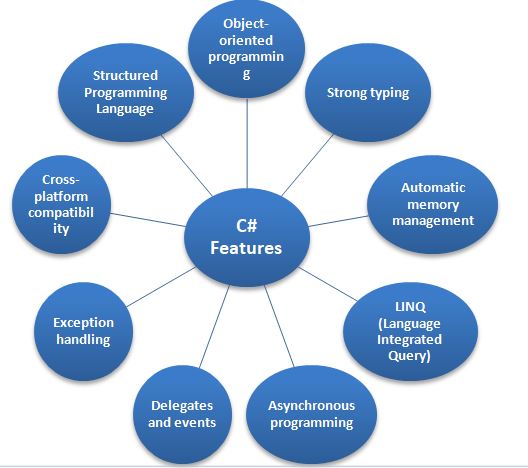C# - Introduction
The C# programming language was designed by Anders Hejlsberg from Microsoft in 2000. C# (pronounced "C sharp") is a modern, object-oriented programming language designed by Microsoft for building modern software applications as Windows applications, web applications, Distributed applications, Web service applications, Database applications and other types of software.
C# has its roots in the C family of languages and will be immediately familiar to C, C++, Java, and JavaScript programmers. C# was first introduced in 2000 as part of the .NET Framework and has since evolved into a powerful and versatile language.
Why Use C#?
- It is one of the most popular programming language in the world.
- It is easy to learn and simple to use
- It has a huge community support
- C# is an object oriented language which gives a clear structure to programs and allows code to be reused, lowering development costs
- As C# is close to C, C++ and Java, it makes it easy for programmers to switch to C# or vice versa
Features of C# Language
There are some important features of C#.

- Object-oriented programming - It is an object-oriented language, which means that it focuses on creating objects that represent real-world entities. This makes it easier to write code that is more modular, reusable, and easier to maintain.
- Strong typing - It is a strongly typed language, which means that variables must be declared with specific data types and cannot be changed later. This helps prevent common coding mistakes and makes it easier to debug code.
- Automatic memory management - It uses a garbage collector to automatically manage memory, which helps prevent memory leaks and other errors that can occur when managing memory manually.
- LINQ (Language Integrated Query) - It includes a powerful feature called LINQ, which allows developers to query data from various sources (such as databases and XML files) using a unified syntax.
- Asynchronous programming - it supports asynchronous programming, which allows multiple tasks to be executed simultaneously without blocking the main thread of execution. This can improve the performance and responsiveness of applications.
- Delegates and events - It includes support for delegates and events, which are powerful mechanisms for handling events and callbacks in code.
- Exception handling - It includes a robust exception handling system, which makes it easier to handle runtime errors and recover from unexpected situations.
- Cross-platform compatibility - It is a cross-platform language, which means that it can be used to build applications that run on a variety of platforms, including Windows, Linux, and macOS.
- Structured Programming Language - It is a structured programming language. So we can break the program into parts using functions. So, it is easy to understand and modify for programmers.
C# Version History
You can also read more about C# Version history from microsoft site - The version history of C#
| Version | .NET Framework | Visual Studio | Important Features |
|---|---|---|---|
| C# 1.0 | .NET Framework 1.0/1.1 | Visual Studio .NET 2002 |
|
| C# 2.0 | .NET Framework 2.0 | Visual Studio 2005 |
|
| C# 3.0 | .NET Framework 3.0\3.5 | Visual Studio 2008 |
|
| C# 4.0 | .NET Framework 4.0 | Visual Studio 2010 |
|
| C# 5.0 | .NET Framework 4.5 | Visual Studio 2012/2013 |
|
| C# 6.0 | .NET Framework 4.6 | Visual Studio 2013/2015 |
|
| C# 7.0 | .NET Core 2.0 | Visual Studio 2017 |
|
| C# 8.0 | .NET Core 3.0 | Visual Studio 2019 |
|
| C# 9.0 | .NET 5.0 | Visual Studio 2019 |
|
| C# 10.0 | .NET 6.0 | Visual Studio 2022 |
|
| C# 11.0 | .NET 7.0 | Visual Studio 2022 |
|
Next
